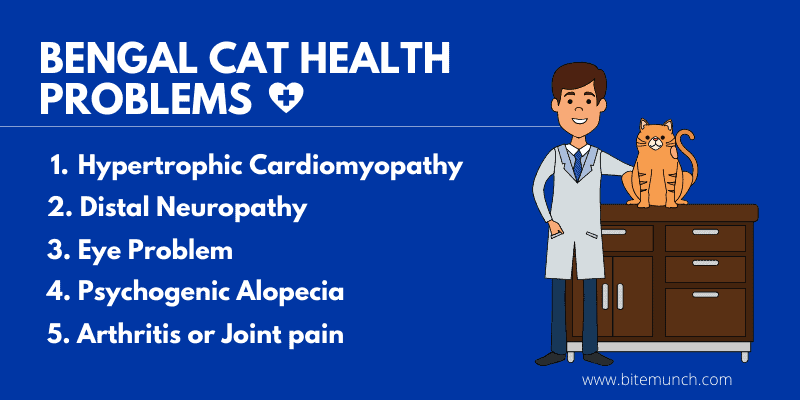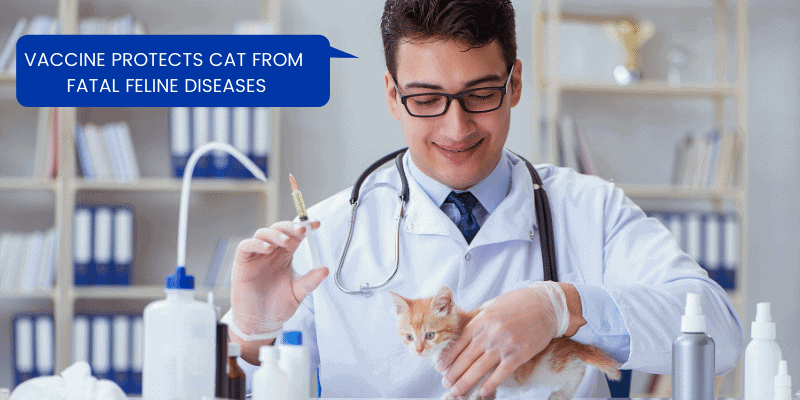The Bengal cat is a hybrid between the Asian Leopard Cat and a domestic cat. This is why the Bengal cat has exotics spotted coat like a tiger.
Though people love Bengal cats because of their stunning looks they may suffer from multiple genetic diseases because of their breed. Here are five common Bengal cat health problems that you must know:

Contents
Hypertrophic Cardiomyopathy
Heart condition like hypertrophic cardiomyopathy is very common in Bengal cats (especially in older cats).
Hypertrophic cardiomyopathy usually causes ventricular myocardium thickening. Actually, this heart disease grows because of high blood pressure.
An increase in blood pressure in the left ventricle of the heart increases the thickness of the myocardium.
This common heart condition in Bengal cats can cause back leg paralysis and can also cause a blood clot.
Here are some common symptoms of hypertrophic cardiomyopathy in Bengal cats:
- Not moving instead dragging the back legs
- Increase in heart rate
- Difficulty in breathing (shortness of breath)
Distal Neuropathy
Distal neuropathy is another Bengal cat health problem that causes a neurological disorder. This disease is common in Bengal cat who is less than 2 years old.
According to a study 9 out of 100 Bengal cats (less than 2 years old) suffer from distal neuropathy. Flowing are the common symptoms of distal neuropathy:
- Stop jumping
- Weakness
- Constipation
- Stop moving
- Walking slowly
In the end, if this disease is not treated properly the affected can get paralyzed and eventually can die after a month or two.
There is not much information about this disease, but veterans are researching this disease to find a better way to treat this disease.
Eye Problem
Bengal cat eyes can become inflamed for many reasons. Such as infection, allergies, scratches, entropion, cancer, increased in blood pressure, etc.
If your cat is winking at you more often if you might be thinking it’s a sign of affection but it is more likely to be eye problems.
Following are the symptoms of eye problems:
- Ocular Discharge
- Squinting Winking
- Unequal Pupils
- Inflamed Conjunctiva
Some eye problems in Bengal cats can be easily treated, but some feline eye problems are serious and need to diagnose by a veterinarian. However, some common eye problems can be treated with proper nutrition and diet.
Psychogenic Alopecia
A cat that excessively licks & grooms itself has a condition known as psychogenic Alopecia. This is one of the most common feline compulsive disorders in Bengal cats because Bengal cats are known for grooming themselves excessively.
Although this disease is not life-threatening, it affects the well-being of the cats.
Alopecia is a fancy term for baldness. Usually, alopecia is common in the head area of a cat (the affected area will not have fur or less fur).
If this is the case with your Bengal cat, don’t hesitate to bring your cat to the vet. Usually, this type of Bengal cat health problem is common in older male cats.
Arthritis or Joint pain
Osteoarthritis is a common disease in cats, particularly in Bengal cats older than 10 years.
If this disease is untreated it can cause serious pain and even your cat may need surgery for a cure.
Therefore, as a Bengal cat owner, you need to know about some common signs of arthritis in your cats. Following are symptoms of arthritis in Bengal cats:
- Behavioural changes
- Difficulty or slowness rising
- Loss of jumping ability
- Change interaction with owners
- Sleeping more often
Note: All the disease mentioned above are genetically inherited diseases of the Bengal cat. This does not mean that Bengal will surely suffer from this disease, its means they are more prone to these diseases.
Non-Inherited Bengal Cat Health Issues
Besides genetically inherited problems, a Bengal cat can also have non-inherited health issues like other cats.
The following are common Bengal cat health issues that are not inherited by genes:
- Feline Dental
- Vomiting
- Diabetes
- Feline Immunodeficiency (FIV)
- Feline Chronic
Bengal Cat Personality
Bengal cat is one of the loving cat breeds. They can easily develop bonds with people with whom they share a living space.
Bengal cats love to climb everywhere & they will get into everything in your house. It’s more like they are not living in your space, you are living in their space.
However, Bengal cats are incredibly intelligent and their uniqueness is not limited by their looks. They can be easily trained to do anything like – closing doors, handshake, not walking on counters, jumping through hoops, etc.
The Bengal cats’ are only recommended for owners who are experienced & want to spend lots of time with their cats.
Bengal Cat Vaccination

Bengal cat does not have any specific vaccine particularly for them. Instead, you can vaccinate your cat like other cats. There are various types of cat vaccines that can protect your cat from fatal feline diseases.
The following are common cat vaccines
However, as a cat owner, you must strictly follow the vaccination rule. If your cat has access to the outside world then there is a possibility that they might infect them with viruses and bacteria.
Bengal cat health problems can be reduced by vaccinating them accordingly. Vaccinating a cat will help the immune system to protect the cat from any particular virus or bacteria.
